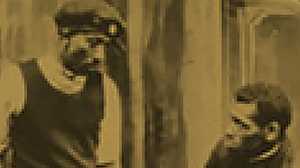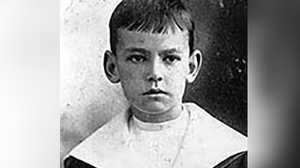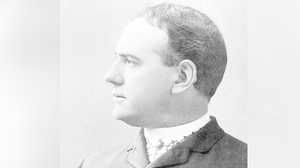Filmmaker Interview: Ric Burns

Filmmaker Ric Burns has made acclaimed historical documentaries including American Experience presentations Coney Island, Ansel Adams, The Donner Party, the epic New York: A Documentary Film, and The Center of the World. Here he talks about his work on the life of playwright Eugene O'Neill.
Why did you choose Eugene O'Neill as a subject?
My friend Arthur Gelb approached me ten years ago to see if I would be interested in making a film about O'Neill — and in a heartbeat, I said yes. O'Neill occupies a fairly unique place in American culture.
When people see Long Day's Journey Into Night, they stumble out, dumbstruck. They didn't know theater could be like that. You go in as one person, and come out another person. No matter how mild-mannered or happy your family is, you can say, "that's my experience."
With artists, and all the more so with great ones like O'Neill, you discover there is a shape to their lives. In O'Neill's case, an amazing question mark arises over it. Here was a man who won three Pulitzer Prizes and a Nobel Prize, and then went on to write the plays for which he will be remembered.
How did O'Neill change American theater?
There was no American theater before Eugene O'Neill. American culture itself was of fairly recent provenance by the early 20th century. American theater was bowdlerlized Shakespeare, comedies of manners borrowed from Europe, and distinctly terrible American melodramas, of which The Count of Monte Cristo, which O'Neill's father starred in for over 5000 performances, is a perfect example. That theater was devoted to the proposition that people were tired and needed to be entertained and uplifted before they went home.
But American culture was craving access to the dark strain that European playwrights like Henrik Ibsen, August Strindberg, and Anton Chekhov had tapped into a generation before. O'Neill recognized that the things that obsessed him were an under-retailed aspect of American culture. He turned himself into the first American tragedian.
His first full-length play to be produced in New York, Beyond the Horizon, took Broadway by storm, and he was off. He was handsome, he was dark, he came from a theatrical background, the deep dysfunction of which was not well known. O'Neill took off in the 1920s. Play after play was a fantastic success or a noble failure. He could do no wrong. He was lionized by American and European critics as a homegrown, 20th-century American Shakespeare.
It's true to say that the critics fell down in front of O'Neill. He wasn't served well by that kind of easy critical headway. But it was something that he himself understood, because he never did the same play twice. He always pushed on to a different form of experimentation, trying constantly to find and forge a distinctively American tragic form. The plays got longer, more baroque, more complex — with masks, Expressionist scenery — and it was tremendously energizing for American culture. Most of those fresh starts turned out to be dead ends, and none of them endured to become masterpieces. But he kept pushing on to new territory.
Then, in the 1930s, his health began to fail, he retreated from Broadway. His real guiding light was an unflinching honesty and a sense of emotional unrest. He wanted to know where that came from and what it meant. He retreated to California with his third wife, Carlotta, and, recognizing his time was running out, he faced everything that had scared him in his complicated family past. And wrenched from himself three full length masterpieces.
What surprised you about his life?
I think what's so moving — and really startling — is the absolute commitment to the art of playwriting. I think that's of universal interest — anybody that's ever tried to do anything that's not mediocre will relate to this story. His story is the story of a man who is absolutely committed, at the highest level, to create art at any cost.
Why did you decide to work with top Broadway actors?
Theater doesn't translate to film very well. There's something about the suspension of disbelief which theater can achieve in real time that doesn't make it down the lens of a camera. This was the biggest challenge our project faced. I made a film on Ansel Adams. You can hold up a photo and say, "here's what Adams did." How do you comparably show what O'Neill did?
We took actors, sat them down in the same chair we interviewed them in, used our regular interview lighting kit, so you didn't have to believe theater was going on. All you had to believe was that an actor of enormous talent was grappling with words of enormous depth. What we discovered was that these words mean everything to them. They required no direction. It was an incredible lesson for me.
Could O'Neill be a success on Broadway today?
Yes, I think O'Neill could be a success on Broadway today. I mean, he is. In 2003, Vanessa Redgrave and Brian Dennehy won Tony Awards for their performances in a revival of Long Day's Journey Into Night. I think great work makes its own audience.
American culture is often and rightly criticized. There's too much commercial work — work that's done for an ulterior motive. It's not being done out of honesty; it's being done to sell something. That's something O'Neill loathed in a particularly vivid way. He never would, as he put it, "let them get him." He never changed his plays to satisfy Broadway businessmen. And you know what? The hunger for reality among human beings is ultimately much stronger than their desire for illusion. We can spend a long time having reality spun to us — politically, commercially — and all of us get to the point when, no matter how painful the truth is, what we really want is to be told the truth. When we find men and women with sufficient bravery, commitment, compassion to tell us the truth, we are first dumbstruck, then we stand on our feet and applaud.
What did O'Neill accomplish with Long Day's Journey Into Night?
When things are complicated, and deep, and hard to get to — hopes and fears and wounds and resentments and the inability to forget... Well, the truth of that can be very hard to get to. How do you really grasp the truth of the meaning of one's person experience? Of two people in a relationship? Multiply that number to four — a mother, a father, their sons — the complexity of the love and fear and pain is almost astronomically complex and deep. O'Neill simply strove to find out what those things were. How were people bound together and torn apart by their feelings and the wounds they inflicted on each other? He was the archaeologist of family life, more than psychoanalyst Sigmund Freud in a sense. He went into the heart of the American family.
If you had had more time what would you have added to the film?
As someone who has sometimes made longer films than this one, I feel blessed at the formal constraint of a bit under two hours. The point isn't to let it sprawl, but the point is to find out what it is at its deepest and most essential. The story of this fascinating, complicated, often benighted, finally redeemed man Eugene O'Neill, doing him the honor of getting at the barest bones of it — that was really, for me — I discovered at the very end how glad I was to be constrained to the limits that we had. This is what it's about — what it's about to be an artist.







